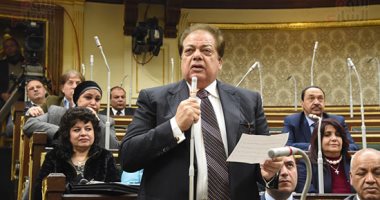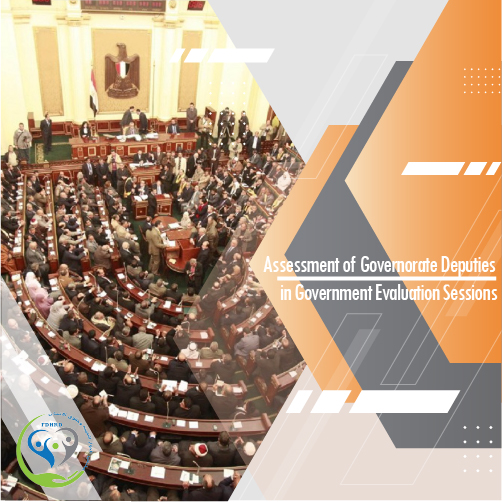Monday, March 29, 2021
Press Release
—————————————————————-
On Monday, March 29, 2021, the Forum for Development and Human Rights Dialogue Foundation issued a policy paper on “Provincial Deputies in Government Assessment Sessions”
The paper stressed that there is importance shown in the digital and statistical reading of parliamentary performance at the beginning of the current legislative chapter, especially in light of the existence of an integrated issue that can be an objective tool for measurement, analysis and conclusion such as the evaluation of government policies and the performance of the ministerial structure in the completion of the government program (2018-2022) in an unprecedented parliamentary behavior and shows the adoption of an objective methodology in the statement of the popular position of plans and programs and also towards those who implement them as a guide or guide to the institution of the presidency Objective vision in support of the decision to develop or replace the ministerial structure.
The paper discussed a series of readings and analyses as follows:
Analysis of the duration of the meetings
The paper pointed out that the period of government evaluation and discussion of ministers witnessed the holding of a number (22) plenary sessions, which was remarkable that among them (13) sessions began on time without any delay in a positive precedent reflecting the extent of the discipline of the deputies and their keenness to abide by. The commitment of the leadership of the Council to its implementation.
A geographical analysis of the deputies’ talks
According to the policy paper, the disparity and difference in the seat quotas for the provinces was reflected during the sessions of evaluation of government performance, where the general trends of turnout and talk by the deputies in the sessions coincided with the numbers for each province, so Cairo came as the most interactive province with the number of (42) deputies starting with Being the most numerous and most populous in addition to being considered as the national capital is the most needy and demanded followed by Giza with the number (39) deputy and then Daqahliya (34) and Al-Sharqiya (32) and Al-Behira (28) which are numbers commensurate with The accumulation of parliamentary expertise of these provinces and the number of their largest deputies within the parliamentary structure in addition to suiting it with the size of the needs and community issues that need support and executive intervention in order to meet them while the provinces were the least in terms of number of deputies to the province of Wadi-Al Gedid as the least at the level of all provinces with the number of deputies (two) followed by South Sinai (3), Suez (3) and Port Said (4) combined by the border nature and the small numbers of residents with the predominance of tribal composition with the consequent sense of dispensation and non-need for sectoral support under a system of solidarity and support based on the bonds of kinship.
It is worth mentioning here that the governorates of (Port Said & Suez) although they are among the (lowest) provinces in terms of the number of people seeking to speak from the deputies and also in terms of the total number of interventions, but they were distinguished from the rest of the provinces as the only two provinces that had all their deputies speak without exception or silence.
Geographical analysis of interventions
The paper stressed that despite the stability in the main centers associated with the number of representatives of each province in the House of Representatives and the associated interaction and participation in the sessions dedicated to discussing the achievement in the implementation of government plans and evaluation of ministerial performance, the nature of each deputy and his desire for differentiation contributed to redrawing the map of participation and changing the order of positive participation between them as Giza governorate advanced to lead the overall ranking by the number (118) intervention showing the effectiveness and efficiency shown by the deputies of the province, Followed by Daqahliya Governorate, which occupied second place with (116) intervention although the average number of its actual deputies puts it in fourth place
Cairo declined to third place with a number (102) intervention as an unacceptable number and does not correspond to the size of its membership or the number of applicants and contributors to enrich the discussions of its deputies, followed by the governorate of Al-Behira with the number (88) interventions ending in the province, which declined from the center (third) in the number of seats to occupy the (fifth) place in the interventions number (85) intervention, which is not commensurate with the nature of the province or the number of representatives and their intellectual and political diversity.
On the other hand, the border and coastal provinces came in the category (the least) in terms of the number of interventions provided by the deputies of each province where Suez occupied the last place with (4) interventions preceded by the provinces (Wadi Al-Gedeed, South Sinai) with the number (5) interventions for each province and then North Sinai (8) and the Red Sea (9), an indicator that needs attention and monitoring to ensure the increase of efficiency and good representation of the demands of the population and residents, especially under the privilege and constitutional protection granted by the Constitution to those governorates away from the rules of justice and population equality for each seat in parliament.
Analysis of the interactions of provincial deputies
According to the paper, Giza governorate occupied the top of the geographical ranking with a number (118) intervention to be followed by a number (12) intervention as an expression of the highest interventions of the representatives of the Al-Sharqiya and Qena and then the number (10) interventions for the governorate (Kafr Al-Sheikh) while the governorates of Al-Behira and Gharbia shared the number of maximum interventions of their deputies with the number of (9) interventions.
On the other hand, the number of (8) interventions came as a maximum presented by the highest deputies of the governorates of Daqahliya, Sohag and Damietta, while (4) shared the maximum number of interventions of its deputies by the number of (7) interventions for each deputy, namely Cairo, Qalyubia, Manufiya and Aswan to repeat the number by (4) Governorates to the maximum of the interventions of their deputies (6) interventions (Minya Luxor Port Said Ismailia) and then (5) governorates and quality blocs (Beni Suef, Assiut, Alexandria, Matrouh Appointees) with the number of interventions (5) for their highest deputies while the province of the Wadi El-Gedeed was unique With the number of interventions (4) followed by (Fayoum, Red Sea, South Sinai) with the number of interventions (3) ending in the governorates (Suez, North Sinai) with the number (two interventions) for the most prominent deputies of each.
Contrary to clear declines in the standards of activity and interaction by the deputies, (6) deputies were able to lead the participation and interaction between the deputies of their provinces, Amal Abdel Hamid (Al-Gharbiya) Maha Shaaban (Menoufia) Maha Abdel Nasser (Minya) Sinaa Al-Saeed (Assiut) Silver Salem Obaidallah (South Sinai) Aida Al-Swarka (North Sinai) as a very important booster that can be considered to give them added power during the upcoming sessions, especially given the nature of the issues and topics raised during the ministerial dialogues.
Geographical analysis of deputies of silence
The paper explained that the figures indicate that among the deputies of the current council, the number of deputies silent during the presentation sessions of the achievement report in the implementation of the government program (131) deputies representing (32.13%) of the total membership of the Council and distributed between (26) provinces and a qualitative parliamentary component in proportions that increase and decrease according to the nature of the province and the number of its representatives in the current council excluding the provinces (Port Said, Suez) which were characterized by the talk and participation of all their deputies without exceptions.
Cairo has led the governorates of silence with 20 deputies in a significant number that requires evaluating performance, especially with the heat of competition wishing to win the seat in its constituencies, although the majority of these silent people came from deputies (lists) and not deputies (singles) Followed by Alexandria (the second capital) with 12 deputies, then Al-Behira (10) and Al-Sharqiya (10), which are densely organic provinces and whose choices have seen controversy related to the dominance of those with broad financial capacity on the main nominations, which may require the implementation of the rules of cooperation With policy-making centers and collective parliamentary offices to support them in playing their roles beyond their concerns and the limited times available to them.
Overall averages of geographical participation trends
According to the paper, by calculating the effectiveness of parliamentary performance, the number of deputies who requested the floor during the sessions of the evaluation of government performance and the questioning of ministers was 461 deputies representing (77.87%) of all members of parliament as an indicator of effectiveness. And the rapid integration into parliamentary work despite the different percentages and size of participations from one province to another according to what can be inferred from the statistical and digital equations that reveal to us that there are (15) provinces that have achieved percentages of participation (higher) than the general average (Al-Gharbiya Minoufia Daqahliya) Kafr Al-Sheikh Giza, Fayoum Beni Suef, Sohag, Luxor, Red Sea, Damietta, Port Said, Suez Matrouh. On the other hand, there were (13) governorates and geographical and qualitative blocs, of which the proportions and numbers of participation came (below) the general average of effectiveness (Cairo Qalyubia Minya Assiut Wadi Al-Gedeed Aswan Al-Sharqiya Ismailia North Sinai South Sinai Alexandria Al-Behira, Appointees)
Analysis of the most interactive deputies
The paper pointed out that there are a number of deputies differentiate and show the fertility of ideas and the ability to interact with the sessions of evaluation of government performance, whether by evaluating public policies and outputs of executive plans and programs or by expressing community demands and taking advantage of opportunities to extract gains for their constituencies in a way that enhances their position among their audiences and voters, where Mp Mohammed Abu Al-Anin (Deputy Council) came as the most interactive and modern deputies during the evaluation sessions with the number (19) intervention followed in the ranking by both deputies Mohammed Hani Abaza and Ashraf Rashad Al-Sharif (representative of the parliamentary majority) with a number (12) interventions each, while the third and fourth positions in the size of the parliamentary interventions were occupied by mp Mustafa Bakri number (11) intervention and mp Mohamed Abdel Hamid Hashim number (10) interventions, and came in fifth place number (3) deputies (Amal Abdul Hamid Bilal Beehal Suleiman and Hadan) with the number (9) interventions for each deputy.
The sixth place was occupied by (4) deputies (Ahmed Al-Awadhi, Hassan al-Mir Ziauddin Daoud Mustafa Salem) with a number of (4) interventions each.
In fact, the digital harvest (previous) of the efficiency of interaction does not stop its significance at the subjective nature of the persons of the deputies, but goes beyond them to wider areas of influence and future inference of the form of parliamentary performance actually despite the apparent disparity in the numbers and percentages of representation between parties (475) deputies and independents (117) deputies, the interaction of deputies showed a fierce competition between them to prove competence and parliamentary merit, where they are equal in the number of speakers (6) deputies each in confirmation of effectiveness despite the limited contribution of the parties to (4 of them) Only (Mostakbal Al-Watan, Al- Wafd, Al-Shaab Al-Gomhori, Homat Al-Watan)








